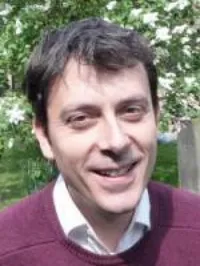Talk: Prof. Alfonso Martinez (February 27, 2023 at 5:00 PM, Seminar room N2409, Zoom)
Talks |
Additive-energy channels
Prof. Alfonso Martinez
Universitat Pompeu Fabra (UPF), Barcelona, Spain.
Abstract:
The additive-energy channels occupy an intermediate region between two widely used channel models: the discrete-time Gaussian channel, used to represent coherent communication systems operating at radio and microwave frequencies, and the discrete-time Poisson channel, which often appears in the analysis of intensity-modulated systems working at optical frequencies. The additive-energy channels share with the Gaussian channel the additivity between a useful signal and a noise component. However, the signal and noise components are not complex-valued quadrature amplitudes but, as in the Poisson channel, non-negative real numbers, the energy or squared modulus of the complex amplitude. In this talk, I shall describe these channels, how they relate to the standard Gaussian channel, and discuss their performance in terms of channel capacity. Contrary to the common engineering wisdom that not using the quadrature amplitude incurs a significant performance penalty, the capacity of the additive-energy channels essentially coincides with that of a coherent Gaussian model under a broad set of circumstances. As a motivating element, I will present an analogy with radiation channels of an arbitrary frequency, for which the quanta of energy are photons. Additive noise is found to be dominant when frequency is low and, simultaneously, the signal-to-noise ratio lies below a threshold; the value of this threshold is well approximated by the expected number of quanta of additive noise.
Biography:
Alfonso Martinez is currently a Serra Húnter Associate Professor at Universitat Pompeu Fabra (UPF), Barcelona, Spain. He obtained his Telecommunications Engineering degree from the University of Zaragoza in 1997. In 1998–2003 he was a Systems Engineer at the research centre of the European Space Agency (ESA-ESTEC) in Noordwijk, The Netherlands. His work on APSK modulation was instrumental in the definition of the physical layer of DVB-S2. From 2003 to 2007 he was a Research and Teaching Assistant at Technische Universiteit Eindhoven, The Netherlands, where he conducted research on digital signal processing for MIMO optical systems and on optical communication theory. Between 2008 and 2010 he was a post-doctoral fellow with the Information-theoretic Learning Group at Centrum Wiskunde & Informatica (CWI), in Amsterdam, The Netherlands. In 2011 he was a Research Associate with the Signal Processing and Communications Lab at the Department of Engineering, University of Cambridge, Cambridge, U.K. He was a Ramón y Cajal Research Fellow at UPF from 2012 to 2016 and an Adjunct Associate Professor there from 2017 to 2019. In this period his research focused on mismatched decoding theory and on the analysis of finite-length communication systems by means of saddlepoint approximations.
His research interests lie in the fields of information theory and coding, with emphasis on digital modulation and the analysis of mismatched decoding. More generally, he is intrigued by the connections between information theory, optical communications, and physics, particularly by the links between classical and quantum information theory.
